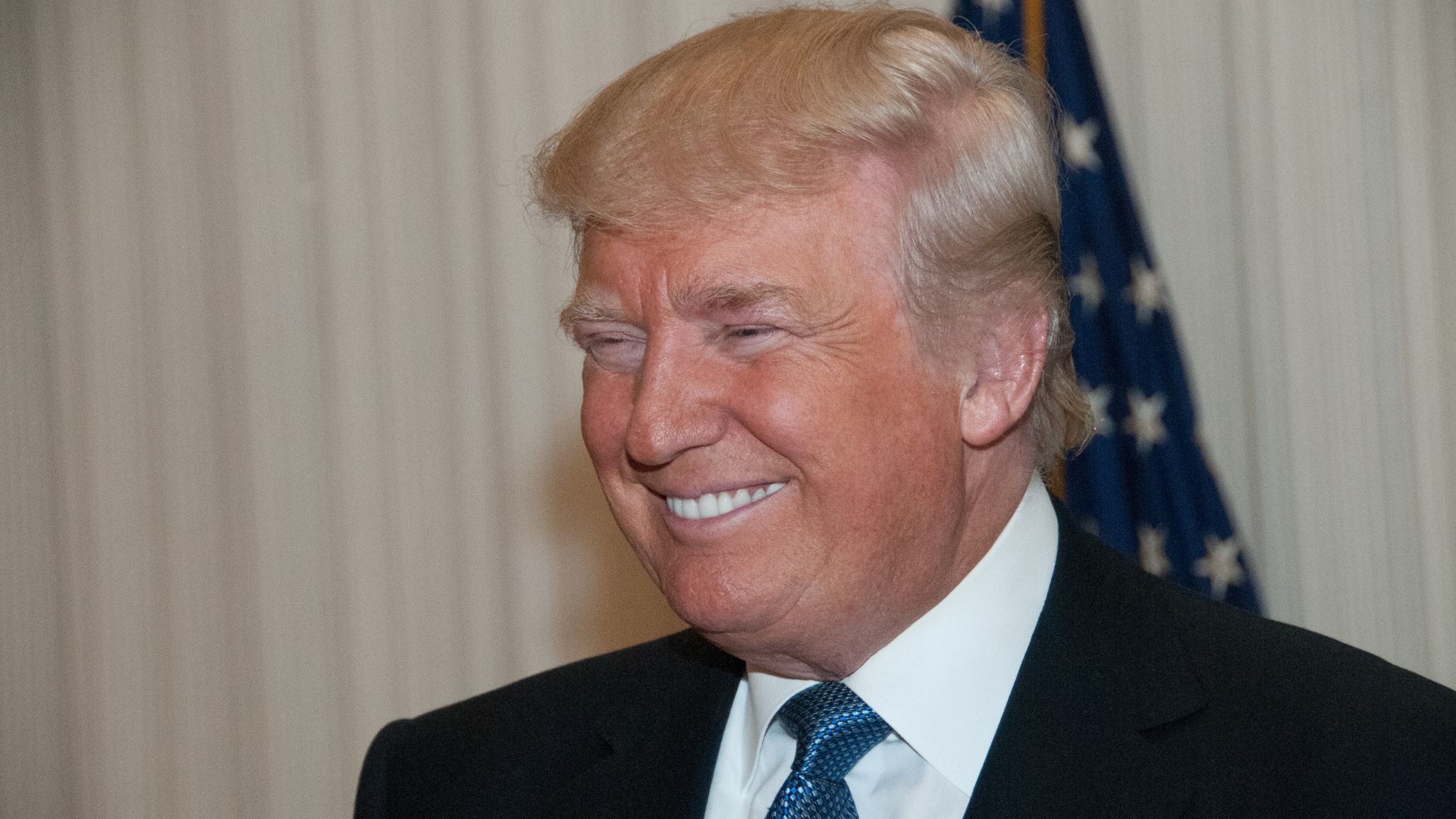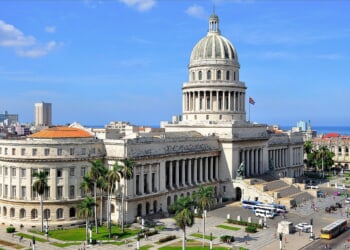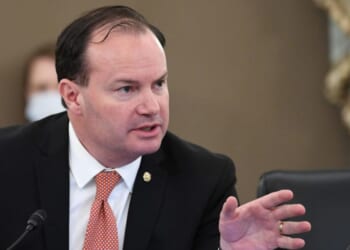
On Sunday, White House Budget Director Russ Vought appeared on CNN’s State of the Union with host Jake Tapper to discuss the administration’s stance on monetary policy, fiscal discipline, and federal oversight.
Vought spoke on several topics, including interest rates, Federal Reserve independence, federal spending cuts, and the national debt.
When asked about the administration’s position on Federal Reserve Chair Jerome Powell, Vought said that President Donald Trump has made his views on interest rates clear but has no intention of removing Powell.
Trump’s Sovereign Wealth Fund: What Could It Mean For Your Money?
“The president has been very clear about that, he says he has no intention of firing the Fed chairman,” Vought said.
“He is putting his viewpoints out there with regard to what interest rates should be, which [are] dramatically lower than where they are.”
Vought continued, “We were up there visiting the renovations and kind of getting a first-hand look ourselves for the extent to which it’s been mismanaged. It’s a host of issues with regard to the Fed, they’ve gone negative in the terms of the profit-loss over the last several years. We don’t get those remittances into the federal treasury… We believe in a host of fronts. Chairman Powell has been too late and the president is doing what the president should do, which is get out there and articulate the views on behalf of the American people.”
.@WHOMB Director @russvought: “We believe on a host of fronts, Chairman Powell has been too late — and the President is doing what the President should do, which is get out there and articulate those views on behalf of the American people.” pic.twitter.com/hKjnMTOS4W
— Rapid Response 47 (@RapidResponse47) July 27, 2025
This Could Be the Most Important Video Gun Owners Watch All Year
The conversation then turned to the independence of the Federal Reserve and its regulatory responsibilities.
Vought stated that the administration respects the Fed’s role but also believes in the importance of public accountability.
“No, I think in fact the patience that the president has demonstrated towards Chairman Powell is in fact a defense of that independence,” Vought said.
“To have Secretary Bessent out there talking about the independence of the Fed, but we also have to articulate the views of the American people and the president with regard to needing lower interest rates and not having a largesse… on the National Mall.”
“There’s a lot of things that need to occur,” he continued.
“And again, the Fed isn’t independent with regard to its regulatory affairs. It’s supposed to go through the cost-benefit analysis that all so-called independent agencies go through. They are not doing that. And so these are the kinds of things we have to do to make sure that these issues are understood and made aware to the country.”
.@WHOMB Director @russvought: “The patience that the President has demonstrated towards Chairman Powell is, in fact, a defense of that independence [of the Fed] … but we also have to articulate the views of the American people.” pic.twitter.com/VmUisbYTY9
— Rapid Response 47 (@RapidResponse47) July 27, 2025
Vought also addressed the federal government’s $37 trillion national debt and the need for spending reductions to improve the country’s fiscal outlook.
“Look, the appropriators want a scenario where we propose cuts and they use that in their bills to then pay down for higher levels of spending. We’re $37 trillion in debt. We actually have to have a dollar of cut go to a dollar of deficit reduction. That’s really what this is about,” Vought explained.
“We ultimately think it makes the appropriations process work better, because you can then have bipartisan votes on top-line levels.”
Vought added, “And if an agency comes along and says, look, we’re finding waste and garbage that the taxpayers wouldn’t want to spend, then we can send those up for rescissions.”
.@WHOMB Director @russvought: “Appropriators want a scenario where we propose cuts and they use that in their bills to then pay down for higher levels of spending. We’re $37 trillion in debt. We actually have to have a dollar of cut go to a dollar of deficit reduction.” pic.twitter.com/LyJnl7J5Ce
— Rapid Response 47 (@RapidResponse47) July 27, 2025
Addressing the Congressional Budget Office’s (CBO) analysis of budget proposals, Vought criticized its assumptions.
“No, the CBO was using artificial baselines that treat spending as eternal and tax relief that was in law since 2017 to be temporary,” he said.
“If you adjust for that—and the bill does have additional tax relief, of which we paid for with spending reductions—this bill reduces deficits and will help us with the national debt.”
Vought concluded by citing incoming tariff revenues and trade agreements currently in development.
“Overall, the moves that we are making as an economic team under President Trump’s leadership will lead to about a third of what’s necessary to balance the budget, given the numbers that you just articulated,” Vought said.
“That’s just in our six months, when you talk about the tariff revenues that are coming in, $3 trillion. CBO believes the same numbers that we have. And, again, those are in advance of a number of the trade agreements that we’re talking about over the next several weeks.”
.@WHOMB Director @russvought: “The moves that we are making as an economic team under President Trump’s leadership will lead to about a third of what’s necessary to balance the budget … That’s just in our [first] six months.” pic.twitter.com/Woeu4xew30
— Rapid Response 47 (@RapidResponse47) July 27, 2025

![Powell, Tariffs, Debt and More [WATCH]](https://www.right2024.com/wp-content/uploads/2025/07/Powell-Tariffs-Debt-and-More-WATCH-750x375.jpg)

![Former Bravo Star Charged After Violent Assault Using a Rock-Filled Sock in Tennessee Walmart [WATCH]](https://www.right2024.com/wp-content/uploads/2025/07/Former-Bravo-Star-Charged-After-Violent-Assault-Using-a-Rock-Filled-350x250.jpg)



![NYC Man Snatches Child Off The Sidewalk, Parents Chase Him Down [WATCH]](https://www.right2024.com/wp-content/uploads/2025/07/NYC-Man-Snatches-Child-Off-The-Sidewalk-Parents-Chase-Him-350x250.jpg)
![Karoline Leavitt Levels CNN's Kaitlan Collins and Other Legacy Media Reporters [WATCH]](https://www.right2024.com/wp-content/uploads/2025/07/Karoline-Leavitt-Levels-CNNs-Kaitlan-Collins-and-Other-Legacy-Media-350x250.jpg)
![Man Arrested After Screaming at Senators During Big Beautiful Bill Debate [WATCH]](https://www.right2024.com/wp-content/uploads/2025/06/Man-Arrested-After-Screaming-at-Senators-During-Big-Beautiful-Bill-350x250.jpg)

![Leftists Lose Their Minds After Jason Kelce Celebrates Being an American [WATCH]](https://www.right2024.com/wp-content/uploads/2025/07/Leftists-Lose-Their-Minds-After-Jason-Kelce-Celebrates-Being-an-350x250.jpg)





